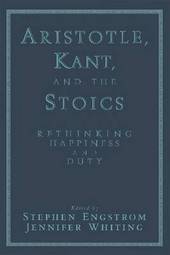
|
Aristotle, Kant, and the Stoics: Rethinking Happiness and Duty
Paperback / softback
Main Details
| Title |
Aristotle, Kant, and the Stoics: Rethinking Happiness and Duty
|
| Authors and Contributors |
Edited by Stephen Engstrom
|
|
Edited by Jennifer Whiting
|
| Physical Properties |
| Format:Paperback / softback | | Pages:324 | | Dimensions(mm): Height 228,Width 152 |
|
| Category/Genre | Western philosophy - Ancient to c 500
Ethics and moral philosophy |
|---|
| ISBN/Barcode |
9780521624978
|
| Classifications | Dewey:170 170 170 |
|---|
| Audience | | Professional & Vocational | | Tertiary Education (US: College) | |
|---|
| Illustrations |
Worked examples or Exercises
|
|
Publishing Details |
| Publisher |
Cambridge University Press
|
| Imprint |
Cambridge University Press
|
| Publication Date |
13 April 1998 |
| Publication Country |
United Kingdom
|
Description
This major collection of essays offers the first serious challenge to the traditional view that ancient and modern ethics are fundamentally opposed. In doing so, it has important implications for contemporary ethical thought, as well as providing a significant re-assessment of the work of Aristotle, Kant and the Stoics. The contributors include internationally recognised interpreters of ancient and modern ethics. Four pairs of essays compare and contrast Aristotle and Kant on deliberation and moral development (John McDowell and Barbara Herman), eudaimonism (T. H. Irwin and Stephen Engstrom), self-love and self-worth (Jennifer Whiting and Allen Wood), and practical reason and moral psychology (Julia Annas and Christine Korsgaard). The final pair of essays introduces the Stoics as an example of how the apparently antithetical views of Aristotle and the Stoics might be reconciled (John Cooper and J. B. Schneewind).
Reviews'Importantly, old stereotypes, or conventional wisdom, about the differences between ancient and modern ethics, especially between Aristotle and Kant, are challenged, exposing possible unities (and historical influences) that tradition has overlooked. However, superficial similarities are also probed and sometimes shown to mask deep remaining differences. The papers call attention to, as well as represent, a quite remarkable contemporary revival of important philosophical/scholarly treatment of the history of ethics, and the authors are, without exception, major players in this movement.' Thomas E. Hill, Jr., University of North Carolina, Chapel Hill
|